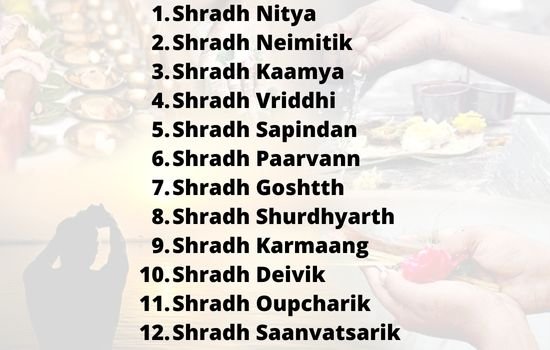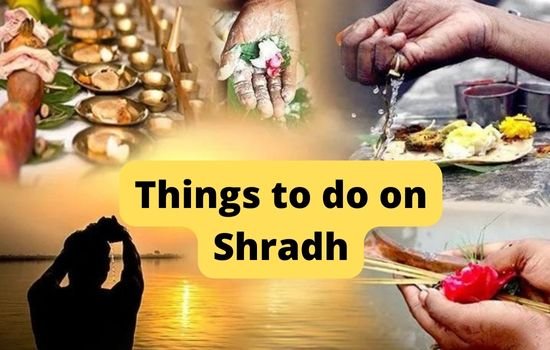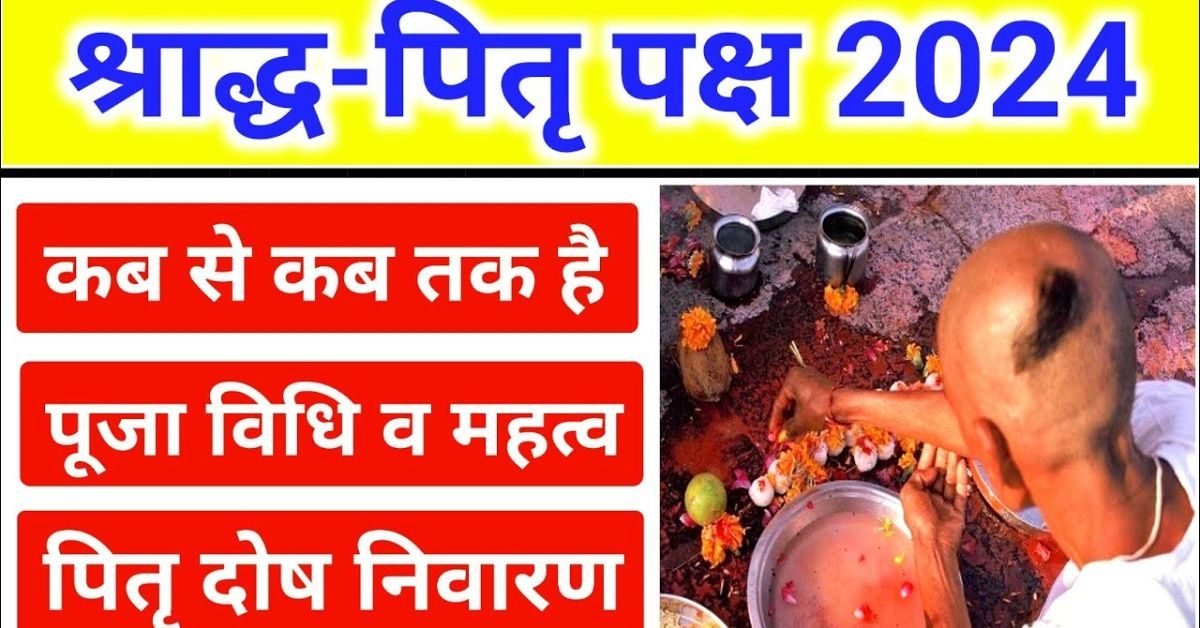Shradh 2024 is a Sanskrit word that combines the words “Sat” for truth and “Adhar” for the foundation. So it refers to any or all acts performed with sincerity and faith. “Shradhyaa Kriyate Yaa Saa”: Shradh is the ritual performed to satisfy one’s ancestors. This ritual expresses unconditional respect for the ancestors.
Shradh begins this year 2024 will begin on Tuesday, 17 September, and ends on Wednesday, 02 October
The significance of Shradh (offering oblations to manes) is immense. Children with all merits & long life are born to those who do shradh rites for their dead ancestors. They stay away from trouble & healthy.
It is also called Pitru Paksha or Mahalaya Paksha, falling in on the dark fortnight of the month of Hindu month Ashvin. One that is done with devotion is called Shradh.
Significance of Shradh in Geeta
God (Shri Krishna) says that if you cannot know my form from the Vedic method. With such faith, you seek favors of a particular demigod and obtain his desires. But in actuality, these benefits are bestowed by Me alone. But who worship by knowing Me to attain Me but those who unknowingly worship devas attain them those who worship Pitru (dead ancestors) achieve them those who worship ghosts attain them Do Shradh but keep in mind the power in the dead ancestors is of my Prabhu (God) the power in demigods is of God
If you start seeing the power of God everywhere, then you’ll remember your bong with Him. By worshipping the manes, one achieves long life, children, fame, heaven, reputation, power, nourishment, wealth, cattle, pleasure, grains, etc. One who doesn’t do shradh is mentioned in Harit Smriti. His clan is devoid of long-lived, brave & healthy people.
Dates for Pitru Paksha Shradh in 2024
Hindu community members pay respect and honor to their beloved ones during the Pitru Paksha season. They do this by engaging in Tarpan and Shradh rituals and praying for salvation.
The Pitru Paksha is performed by those who follow the Amavasya calendar during the Krishna Paksha in the month of Bhadrapada and by those who follow the Purnima calendar during the month of Ashwin.
Types of Shradh in Hinduism

To summarize, this is one of the most important and noble ceremonies or rituals of the Hindu religion, and the person performing it must understand its significance. Only then will the ritual’s true purpose be realized. It is also believed that if Shradh is performed with complete devotion, the ancestors will bless the house, and it will always prosper.
One who doesn’t do these Rituals
One who does not do shradh in his house, brave people are not born. No one will be diseased free Money doesn’t stay for long, nor they have a long life, and for some reason or other, troubles are always present complete well-being is never current.
Maharishi Jabalya said, “by performing shradh, one attains progeny, long life, health, unparalleled opulence & desired things.” because manes are satisfied by our offerings. In turn, they help us. Maharishi Sumantu has said there is no better way of well-being for a householder than Shradh. It is mentioned in the Vishnu Puran.
One who doesn’t believe in manes or doesn’t worship them
Brahma, Indra, Rudra, Ashwini Kumar, Surya, Agni & Ashtvasu, Vayu, Rishi, Humans, Animals, Birds, Reptiles, and all other organisms are not satisfied by his good deeds neither do they accept it. But they are fond of those who worship their deceased ancestors.
It is mentioned in the Markandeya Puran that in the clan where shradh is not done there, brave, healthy, and long-living progeny are not born.
-
- There are 96 small events when shradh can be done.
-
- These 15 days is the dark fortnight of the month of Ashvini’s ancestor. Hence, the Hindu almanac is considered important.
Read more: The Science Behind Astrology And Its Effects On Human Lives
During Rituals

-
- During the Shradh pooja, the following rituals are performed:
-
- Should prepare only vegetarian food, including your ancestor’s favorite food. This food is served to Brahmins and Pandits.
-
- The food should be offered first to the first Brahmin, and then the family should eat.
-
- Offer prayers for the salvation of ancestors’ souls.
-
- Food should be given to crow, cows, and dogs.
-
- Feed the poor or needy for the sake of your ancestors’ souls.
-
- Pind Daan, the ritual of offering rice, sesame seeds, and barley flour balls, should be performed.
Do’s and Don’ts during Shradh
-
- The person doing the Shradh shouldn’t call many priests and relatives.
-
- A maximum of 3 Brahmins are enough.
-
- And those relatives who will demand attention are best kept away.
-
- In the days of shradh, follow celibacy.
-
- And the priest who will do shradh should too.
-
- Completing our 1 year is equivalent to 1 day in the abode of our ancestors. So, when we do shradh once a year, it satisfies our ancestors.
-
- If we use Tulsi during shradh, it gives our ancestors satisfaction for Kalpa (4.32 billion years).
Things to don’t do on Shradh
-
- Avoid eating rice, non-veg, garlic, onion, and outside food during Pitru Paksha. Also, avoid cooking or eating brinjal.
-
- Masoor, kali urad, chana, black jeera, black salt, black mustard, and any impure or stale food product should not be used in Shradh food.
-
- The person performing the Shradh rituals should avoid cutting his nails.
-
- Should not shave or get a haircut.
-
- He should not dress in dirty clothes.
-
- He should not wear leather products such as a belt, wallet, or shoes while performing Shradh rituals.
-
- Never disturb your Shradh rituals or mantra chanting to speak with someone. It may bring with it negative energy.
-
- During Shradh, addiction destroys your good works and donations. For example, people frequently chew tobacco, smoke cigarettes, or consume alcohol. Don’t engage in such bad behavior. It impedes the fruitful outcome of performing Shradh karma.
-
- Avoid making physical contact. Be in a state of celibacy.
-
- Don’t tell lies, use harsh language, or curse others.
-
- If possible, avoid wearing slippers in the house for the entire 16-day period.
-
- For Shradh pooja and rituals, avoid using black or red flowers, as well as extremely smelling or flavorless flowers.
-
- It is also forbidden for the person performing Shradh rituals to eat frequently on the day of Shradh.
-
- For rituals, avoid using iron vessels. To please your ancestors, instead use gold, silver, copper, or bronze vessels.
Things to do on Shradh

-
- Do clean yourself by taking a bath.
-
- Satvik food should only be prepared at home.
-
- Things which will be used during the event should be immaculate.
-
- Women shouldn’t be on their periods.
-
- The earth (floor) should be clean. Use cow dung and urine for further purification along with til & Jau. Also, keep your mind uncluttered.
-
- Chant mantras do not wrongly pronounce.
-
- The priest should have pure intentions. And he should not eat tobacco etc.
-
- (It is not there in Shastras, but I have included it )
3 things are considered pure during the rituals
-
- Sesame seed
-
- Daughter’s son (it would be good if he does Shradh pooja)
-
- The time between 11:36 am to 12:24 pm Kutup Muhurat (8th part of the day, i.e., noon time)(It is okay if you are late/early 5-10 min).
Doing Shradh at this time is more auspicious.
They chant the mantra at the beginning & end of the Sraddha ritual. Any mistakes committed are forgiven. The deceased ancestors become happy Demonic powers are warded off DevtAbhyah pitrIbhyashcha mahOyOgibhya Eva cha Namah swadhAyae swAhAyae nitymEv Namo Namah.
This mantra is also written in the Shradhh Mahima book of our ashram. Chant this mantra 3 times each at the ritual’s beginning and end. Performing Sraddha in pilgrimages like Gaya, Pushkar, Prayag, and Haridwar by pious Brahmins is good (not for those who are after money). Where there is a cow shed, Temple, or River bank- those places are best for shradh, or it also can be done at home by applying cow dung paste & dust from cow’s feet on the floor, sprinkling water in the name of God. We get inner satisfaction by offering tarpan to our dead grandfathers, grandmothers, father, mother, dead people of our clan, etc.
Conclusion
Similarly, if someone worships the ancestors, he will meet them in his next life and suffer alongside them. Likewise, anyone who worships (serves) ghosts will turn into a spirit. Therefore, it is against the scriptures to perform worship forbidden in the holy Gita and the holy four Vedas.
According to Holy Gita Adhyay 16 Shlok 23-24, those who engage in unordered behavior (worship) by abandoning the scriptures do not attain happiness, salvation, or happiness. That is, their lives have been squandered. Accordingly, Arjuna, the scriptures are evidence in the arrangement of what to do and what not to do for you. Therefore, only engage in the spiritual practices mentioned in the Gita and ignore the rest.




